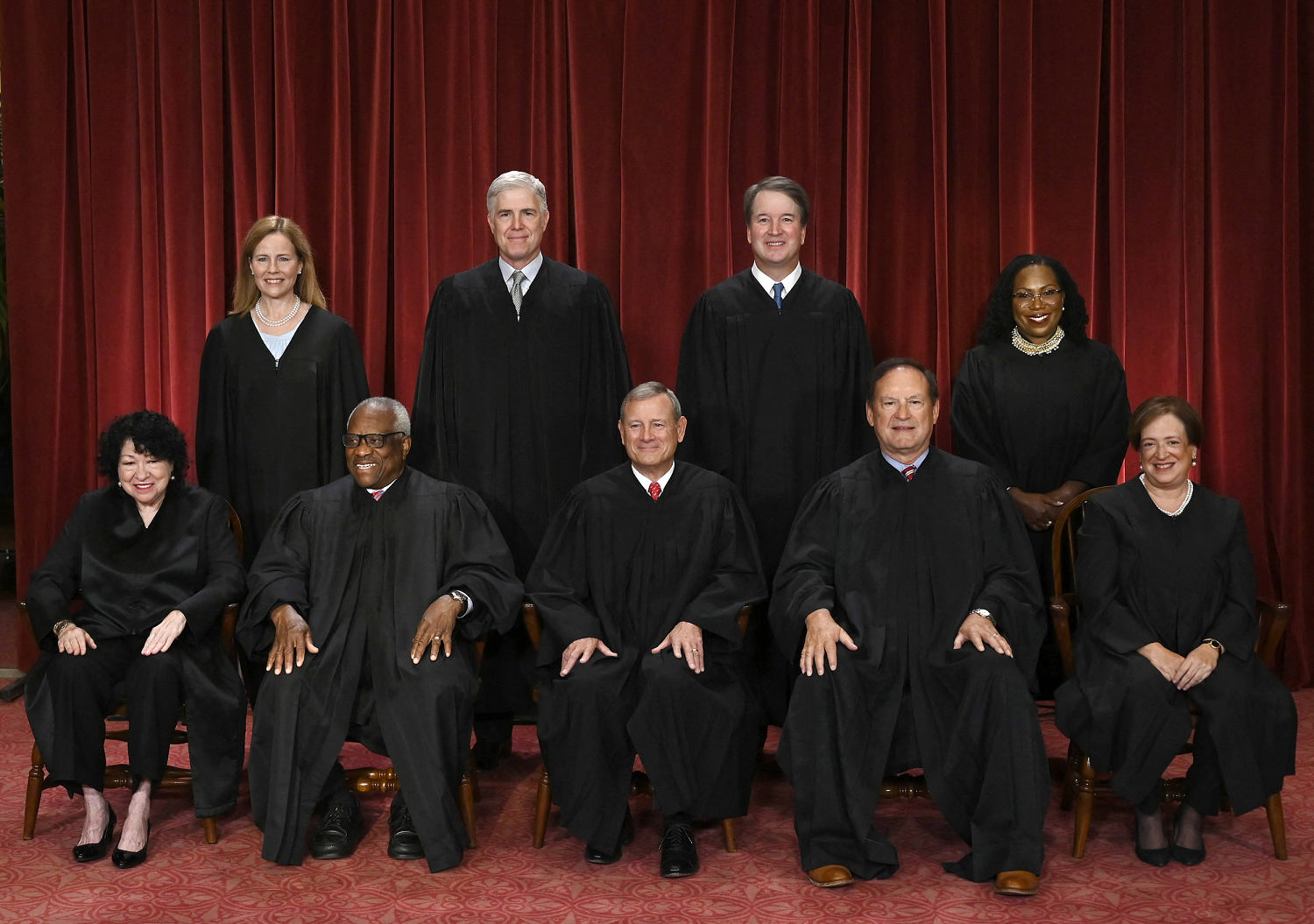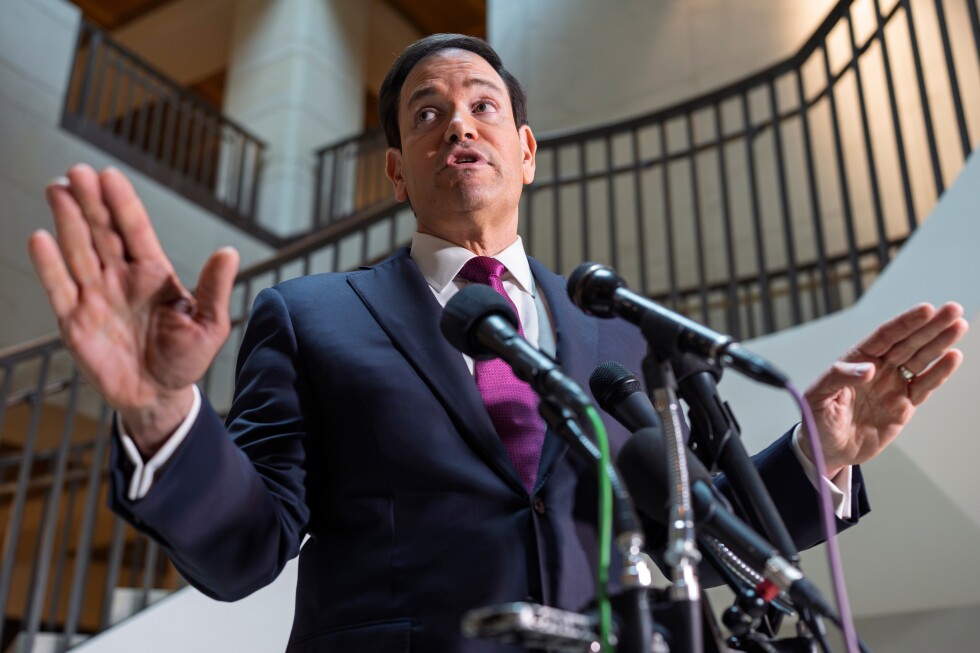The Dictatorship
Supreme Court to hear what could be the biggest case of its term

The Supreme Court is scheduled to hold a hearing Wednesday in an appeal involving transgender rights that could be the most important case of the court’s term.
The legal question in the case, called United States v. Skrmetti, is whether a Tennessee law banning gender-affirming care for minors violates the Constitution’s equal protection guarantee. How the court answers the question could affect similar laws across the country and transgender rights more broadly.
Three lawyers are set to argue to the justices in Washington. U.S. Solicitor General Elizabeth Prelogar represents the federal government and Tennessee Solicitor General J. Matthew Rice represents the state, whose attorney general is Jonathan Skrmetti (hence the case name, United States v. Skrmetti). American Civil Liberties Union lawyer Chase Strangio represents the original plaintiffs in the lawsuit: transgender adolescents, their parents and a doctor who treats adolescents with gender dysphoria. Strangio will be the first openly transgender lawyer to argue at the court.
It’s not unprecedented for more than two parties to argue in a case. But the dynamic could be especially important here because the incoming Trump administration could take a different position than the Biden administration, which intervened in the suit against the state law. So it’s possible the group Strangio represents will be the only adversarial party to Tennessee when the justices eventually decide the case, if the federal government tells the court it no longer disagrees with the state after Trump takes office next month.
A decision is expected by the summer, when the court usually finishes ruling on cases heard during the term that started in October.
For now, at least, the federal government opposes the state. Arguing that the law, called SB1, is unconstitutionally discriminatory, Prelogar’s office wrote in a brief ahead of the hearing that, under the law:
… an adolescent assigned female at birth cannot receive puberty blockers or testosterone to live as a male, but an adolescent assigned male at birth can. And that focus on sex and gender conformity is deliberate: SB1 declares that its very purpose is to “encourag[e] minors to appreciate their sex” and to ban treatments “that might encourage minors to become disdainful of their sex.”
“That,” the federal government argues, “is sex discrimination.”
Defending the law, the state wrote in its own brief that it’s “not unconstitutional discrimination to say that drugs can be prescribed for one reason but not another.” The state further argued that the law doesn’t classify people based on sex but rather “creates two groups: minors seeking drugs for gender transition and minors seeking drugs for other medical purposes.”
Like the federal government, the private parties represented by Strangio argue that the law “imposes differential treatment based on the sex an individual is assigned at birth.” In support of their position, they cite the Supreme Court’s 2020 decision in Bostock v. Clayton County, which said that an employer violates federal civil rights law when they fire someone for being gay or transgender.
Notably, that 6-3 ruling was authored by Trump appointee Neil Gorsuch and joined by Chief Justice John Robertsso those justices’ questions at the hearing will be among the important ones to watch for.
Subscribe to theDeadline: Legal Newsletterfor expert analysis on the top legal stories of the week, including updates from the Supreme Court and developments in Donald Trump’s legal cases.
Jordan Rubin is the Deadline: Legal Blog writer. He was a prosecutor for the New York County District Attorney’s Office in Manhattan and is the author of “Bizarro,” a book about the secret war on synthetic drugs. Before he joined BLN, he was a legal reporter for Bloomberg Law.
The Dictatorship
TENSIONS FLARE ON HILL

WASHINGTON (AP) — Tensions flared as questions mounted at the U.S. Capitol on Tuesday over the Trump administration’s shifting rationale for war with Iran as lawmakers demand answers over the strategy, exit plan and costs to Americans in lives and dollars for what is quickly becoming a widening Middle East conflict.
Trump officials made their case at the Capitol during a second day of closed-door briefings, this time with all members of the House and Senate ahead of a looming war powers resolution vote intended to restrict Trump’s ability to continue the joint U.S.-Israel campaign against Iran.
“The president determined we were not going to get hit first. It’s that simple,” Secretary of State Marco Rubio said in a testy exchange with reporters at the Capitol.
Rubio pushed back on his own suggestion a day earlier that Trump decided to strike Iran because Israel was ready to act first. Instead, he said Trump made the decision to attack this past weekend because it presented a unique opportunity with maximum chance for success.
“There is no way in the world that this terroristic regime was going to get nuclear weapons, not under Donald Trump’s watch,” he said.
The sudden pivot to a U.S. wartime footing has disrupted the political and policy agenda on Capitol Hill and raised uneasy questions about the risks ahead for a prolonged conflict and regime change after the killing of Iran’s Supreme Leader Ayatollah Ali Khamenei. At least six U.S. military service personnel have died so far.
The situation has intensified the push in Congress for the war powers resolution — among the most consequential votes a lawmaker can take, with the war well underway — as administration officials are telling lawmakers they will likely need supplemental funds to pay for the conflict. It comes at the start of a highly competitive midterm election season that will test Trump’s slim GOP control of Congress.
Senate Democratic Leader Chuck Schumer left the closed hearing, saying he was concerned about “mission creep” in a long war.
Defense Secretary Pete Hegseth arrives for a briefing for lawmakers on Iran at a secure room in the basement of the Capitol in Washington, Tuesday, March 3, 2026. (AP Photo/J. Scott Applewhite)
Defense Secretary Pete Hegseth arrives for a briefing for lawmakers on Iran at a secure room in the basement of the Capitol in Washington, Tuesday, March 3, 2026. (AP Photo/J. Scott Applewhite)
Senators demand answers, and some cheer Trump on
Senators spent the morning grilling Trump officials during an Armed Services Committee hearing over Rubio’s claim Monday that the president, believing that Israel was ready to act, decided it was better for the U.S. to launch a preemptive strike to prevent Iran’s potential retaliation on American military bases and interests abroad.
Sen. Angus King, the independent from Maine, said it’s “very disturbing” that Trump took the U.S. to war because Israel’s Prime Minister Benjamin Netanyahu wanted to bomb Iran. Past U.S. presidents, he said, “have consistently said, ‘No.’”
Defense official Elbridge Colby told senators the president directed the military campaign to destroy Iranian missiles and deny the country nuclear weapons.
Trump himself disputed the idea that Israel had forced his hand. In his own Oval Office remarks, he said, “I might might have forced their hand.”
Sen. Markwayne Mullin, a Trump ally from Oklahoma, said the president “did the world a favor.”
“How about we say, ‘Thank you, Mr. President, for finally getting rid of this nuisance,’” he said.
But Sen. Elizabeth Warren, D-Mass., demanded to know how this fits into Trump’s “America First” campaign promise not to commit U.S. troops to protracted military campaigns abroad.
Trump has suggested the war could drag on, and has not ruled out sending American troops into Iran.
“’America First’ and ‘peace through strength’ are served by rolling back — as the military campaign is designed to do — the threats posed,” Colby responded. “This is certainly not nation-building. This is not going to be endless.”
Senate Majority Leader John Thune, R-S.D., arrives for a briefing for Senators on Iran at a secure room in the basement of the Capitol in Washington, Tuesday, March 3, 2026. (AP Photo/J. Scott Applewhite)
Senate Intelligence Committee Sen. Mark Warner, D-Va., speaks to reporters following a House and Senate Intelligence Committees briefing about the war in Iran at the Capitol in Washington, Monday, March 2, 2026. (AP Photo/Manuel Balce Ceneta)
What’s next for the Iranian regime and its people
Questions are growing over who will lead Iran after the death of Khamenei, who has ruled the country for decades, and worries of a leadership vacuum that creates unrest.
Democrats warned against sending U.S. military troops into Iran after more than two decades of war in Iraq and Afghanistan in the aftermath of the Sept. 11, 2001, attacks.
“I am more fearful than ever we may be putting boots on the ground,” said Sen. Richard Blumenthal, D-Conn., after the closed briefing.
And while House Republicans applauded in support of the Trump administration’s operations, warning signs flared.
Rep. Chip Roy, R-Texas, said he supports the operation, for now. “My flag starts going up, the longer this goes, my flag starts going up, the more there’s boots on the ground,” he said.
Many lawmakers expressed concern over the number of Americans calling their offices seeking help evacuating from the region as the war spreads. “It’s getting worse, not better,” said Rep. Jason Crow, D-Colo., a former Army Ranger.
Trump, in calling for Iranians to seize this opportunity to take back their country, has acknowledged the uncertainty.
“Most of the people we had in mind are dead,” Trump said Tuesday. He also panned the idea of elevating Reza Pahlavi, the exiled crown prince of Iran’s last shah, to take over in Iran.
Republicans insist it’s not for the Americans to decide the future of Iran.
“That’s going to be largely up to the Iranian people,” said Senate Majority Leader John Thune, a Republican.
House Speaker Mike Johnson said flatly, “We have no ability to get into the nation-building business.”
President Donald Trump departs after a Medal of Honor ceremony in the East Room of the White House, Monday, March 2, 2026, in Washington. (AP Photo/Alex Brandon)
President Donald Trump departs after a Medal of Honor ceremony in the East Room of the White House, Monday, March 2, 2026, in Washington. (AP Photo/Alex Brandon)
War powers resolutions become a consequential vote
Both the House and Senate are preparing to vote on war powers resolutions that would restrain Trump’s ability to continue waging war on Iran without approval from Congress.
Under the U.S. Constitution, it’s up to Congress, not the president, to decide when the country goes to war. But lawmakers often shirk that duty, enabling the executive branch to amass more power to send the military into combat without congressional approval.
“Why are we spending billions of dollars to bomb Iran?” said House Democratic Leader Hakeem Jeffries, who said there would be strong support from Democrats for the resolution.
But Johnson has said it would be “frightening” and “dangerous” to tie the president’s hands at this time, when the U.S. is already engaged in combat.
Other lawmakers have suggested that if Congress does not vote to restrain Trump, it should next consider an Authorization of the Use of Military Force, which would require lawmakers to go on record with affirmative support for the Iran operation.
“The reason why there’s so much consternation on our side is because President Trump has not given us a clear reason why he is in Iran,” said Sen. Kirsten Gillibrand, D-N.Y. “If he wants to declare war on Iran, that is the job and responsibility of Congress under the Constitution.”
Former President George W. Bush sought, and received, authorization from Congress to launch the post-9/11 wars.
___
Associated Press writers Stephen Groves and Mary Clare Jalonick contributed to this report.
The Dictatorship
Trump threatens to cut off trade with Spain

WASHINGTON (AP) — President Donald Trump on Tuesday threatened to end trade with Spainciting a lack of support over the U.S. and Israeli attacks on Iran and the European nation’s resistance to increasing its NATO spending.
“We’re going to cut off all trade with Spain,” Trump told reporters during an Oval Office meeting with German Chancellor Friedrich Merz. “We don’t want anything to do with Spain.”
The U.S. president’s comments came a day after Spanish Foreign Minister José Manuel Albares said his country would not allow the U.S. to use jointly operated bases in southern Spain in any strikes not covered by the United Nations’ charter. Albares noted that the military bases in Spain were not used in the weekend attack on Iran.
Trump said despite Spain’s refusal “we could use their base if we want. We could just fly in and use it. Nobody’s going to tell us not to use it, but we don’t have to.”
It is unclear how Trump would cut off trade with Spain, given that Spain is under the umbrella of the European Union. The EU negotiates trade deals on behalf of all 27 member countries.
“If the U.S. administration wishes to review the trade agreement, it must do so respecting the autonomy of private companies, international law, and bilateral agreements between the European Union and the United States,” a spokesperson from Spanish Prime Minister Pedro Sánchez’s office said Tuesday.
The EU said it expects the Trump administration to honor a trade deal struck with the 27-nation bloc in Scotland last year after months of economic uncertainty over Trump’s tariff blitzkrieg.
“The Commission will always ensure that the interests of the European Union are fully protected,” said European Commission spokesperson Olof Gill.
It was just the latest instance of the president wielding the threat of tariffs or trade embargoes as a punishment and came on the heels of a Supreme Court decision that struck down Trump’s far-reaching global tariffs. While the court said that the International Emergency Economic Powers Act does not authorize the president to unilaterally impose sweeping tariffs, Trump now maintains that the court allows him to instead impose full-scale embargoes on other nations of his choosing.
Trump also complained anew Tuesday about Spain’s decision last year to back out of NATO’s 5% defense spending target. At the time, Spain said it could reach its military capabilities by spending 2.1% of its GDP, a move that Trump roundly criticized and responded to with tariff threats as well.
Spain, Trump said, is “the only country that in NATO would not agree to go up to 5%” in NATO spending. “I don’t think they agreed to go up to anything. They wanted to keep it at 2% and they don’t pay the 2%.”
Merz noted that Trump was correct and said, “We are trying to convince them that this is a part of our common security, that we all have to comply with this.”
Spain defended its position Tuesday, saying it is “a key member of NATO, fulfilling its commitments and making a significant contribution to the defense of European territory,” the spokesperson in Sánchez’s office said.
During the Oval Office meeting, Trump turned to U.S. Treasury Secretary Scott Bessent for his opinion on the president’s embargo authority.
Bessent said, “I agree that the Supreme Court reaffirmed your ability to implement an embargo.” Bessent added that the U.S. Trade Representative and Commerce Department would “begin investigations and we’ll move forward with those.”
A representative from the U.S. Treasury Department did not respond to a request from The Associated Press for additional comment.
Sánchez has been critical of the U.S. and Israeli attacks on Iran, calling it an “unjustifiable” and “dangerous” military intervention. His government has demanded an immediate de-escalation and dialogue and also condemned Iran’s strikes across the region.
Trump said, “Spain has absolutely nothing that we need other than great people. They have great people, but they don’t have great leadership.”
Spain’s position on the use of U.S. bases in its territory marks the latest flare-up in its relationship with the Trump administration. Under Sánchez, Europe’s last major progressive leader, Spain was also an outspoken critic of Israel’s war in Gaza.
___
Naishadham reported from Madrid. AP journalist Sam McNeil in Brussels contributed.
The Dictatorship
The Latest: US and Israel attack Iran as Trump says US begins ‘major combat operations’

Rice secures 80-74 win over Temple
Anthony’s 16 help Iona beat Manhattan 69-65
Folefac scores 23 as Siena beats Rider 76-61
SnoCountry Mountain Reports
Gulf States Sportswatch Daily Listings
Quinnipiac wins 67-63 against Canisius
-

 The Dictatorship1 year ago
The Dictatorship1 year agoLuigi Mangione acknowledges public support in first official statement since arrest
-

 Politics1 year ago
Politics1 year agoFormer ‘Squad’ members launching ‘Bowman and Bush’ YouTube show
-

 Politics1 year ago
Politics1 year agoBlue Light News’s Editorial Director Ryan Hutchins speaks at Blue Light News’s 2025 Governors Summit
-

 The Dictatorship6 months ago
The Dictatorship6 months agoMike Johnson sums up the GOP’s arrogant position on military occupation with two words
-

 Politics1 year ago
Politics1 year agoFormer Kentucky AG Daniel Cameron launches Senate bid
-

 The Dictatorship1 year ago
The Dictatorship1 year agoPete Hegseth’s tenure at the Pentagon goes from bad to worse
-
Uncategorized1 year ago
Bob Good to step down as Freedom Caucus chair this week
-

 Politics11 months ago
Politics11 months agoDemocrat challenging Joni Ernst: I want to ‘tear down’ party, ‘build it back up’




